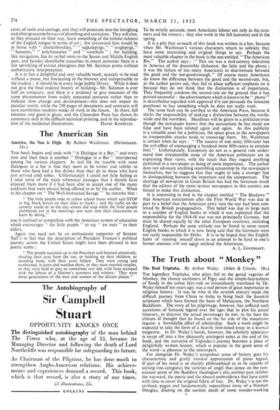The American Sin
THIS book begins and ends with "A Dialogue in a Bar," and every now and then there is another " Dialogue in a Bar " interspersed among the various chapters. In real life the trouble with most dialogues in a bar is that they seem to be wittier and subtler to those who have had a few drinks than they do to those who have just arrived cold sober. Unfortunately I could not help feeling as I read some of the more whimsical passages that I should have enjoyed them more if I had been able to accept one of the many cocktails that were always being offered to or by the author. When in his chapter on " The Well-Instructed Savage " he remarks that :
" The little people rode in yellow school buses which said STOP in big, black letters on their sides or backs ; and the traffic on the country roads or in the city streets did stop while the little people clambered out in the mornings and went into their classrooms to learn by doing,"
one is inclined to sympathise with the American system of education which encourages " the little people " to say " aw nuts " to their elders.
Again one need not be an enthusiastic supporter of Senator Taft's to feel that the description of President Truman's political journey across the United States might have been phrased in less poetic terms :
" The people squinted up at the President and listened attentively, shading their eyes from the sun, or holding up their children, or standing mute, with their arms folded. They were young and sunburned, in jeans and woollen shirts, or they were married couples, or they were bald or grey or sometimes very old, with faces stamped with the labour of a lifetime's summers and winters. They were three generations of the men and women of the distant places."
To be strictly accurate, most Americans labour not only in the.,sum- mers and the winters ; they also work in the fall (autumn) and in the spring.
It is a pity that so much of this book was written in a bar, because when Mr. Waithman's various characters return to sobriety they have some 'interesting and original things to say. Perhaps the most valuable chapter in the book is the one entitled "The American Sin." The author says : " This sin was a mid-century toleration in America of the discernibly dishonest, the false and the phony ; it was the failure of too many Americans to discriminate between the good and the not-good-enough." Of course many Americans do know the difference between the good and the second-rate, but, as the author points out, they fail to place sufficient emphasis on it because they do not think that the distinction is of importance. They frequently condone the second-rate on the ground that it has proved successful : the advertisement which is known to be " phony" is nevertheless regarded with approval if it can persuade the innocent purchaser to buy something which he does not really want.
The same fault can be ascribed to the American Press, because it shirks the responsibility of making a distinction between the worth- while and the worthless. Headlines will be given to a politician even though the newspaper knows that the accusations he has made are false and have been refuted again and again. As this publicity is a valuable asset for a politician, the space given in the newspapers to irresponsible attacks tends to encourage them. Mr. Waithman is correct when he says : " The success of one noisy fifth-rater has the evil effect of encouraging a hundred more fifth-raters to emulate him." Unfortunately, Europeans do not as a general rule under- stand how irresponsible some of the American politicians are in expressing their views, with the result that they regard anything published in a newspaper as being of some importance. The author does not advocate anything resembling censorship by the newspapers themselves, but he suggests that they ought to take a stronger line in distinguishing between the important and the unimportant. The shortage of newsprint in Great Britain has had the fortunate result that the editors of the more serious newspapers in this country are forced to make this distinction.
It is interesting to find in the chapter entitled " The Shadows " that American isolationism after the First World War was due in part to a belief that the American entry into the war had been con- trived by British propagandists. This belief was due in large part to a number of English books in which it was explained that the responsibility for the 1914-18 war was not principally German, but must be shared equally by the other European countries, including England. Perhaps the same attitude can be found in some recent English books in which it is now being said that the Germans were not really responsible for Hitler. It is to be hoped that this English habit of running oneself down in an attempt to be kind to one's former enemies will not again mislead the Americans.
A. L. GOODHART.


































 Previous page
Previous page